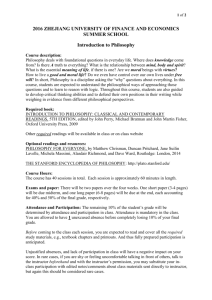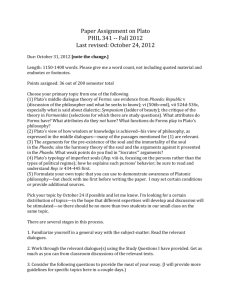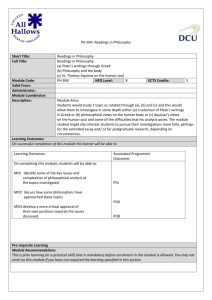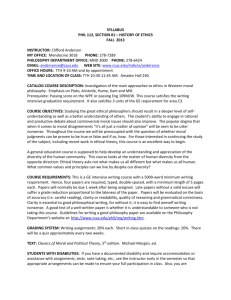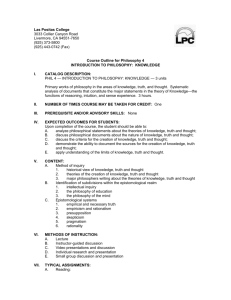Syllabus
advertisement
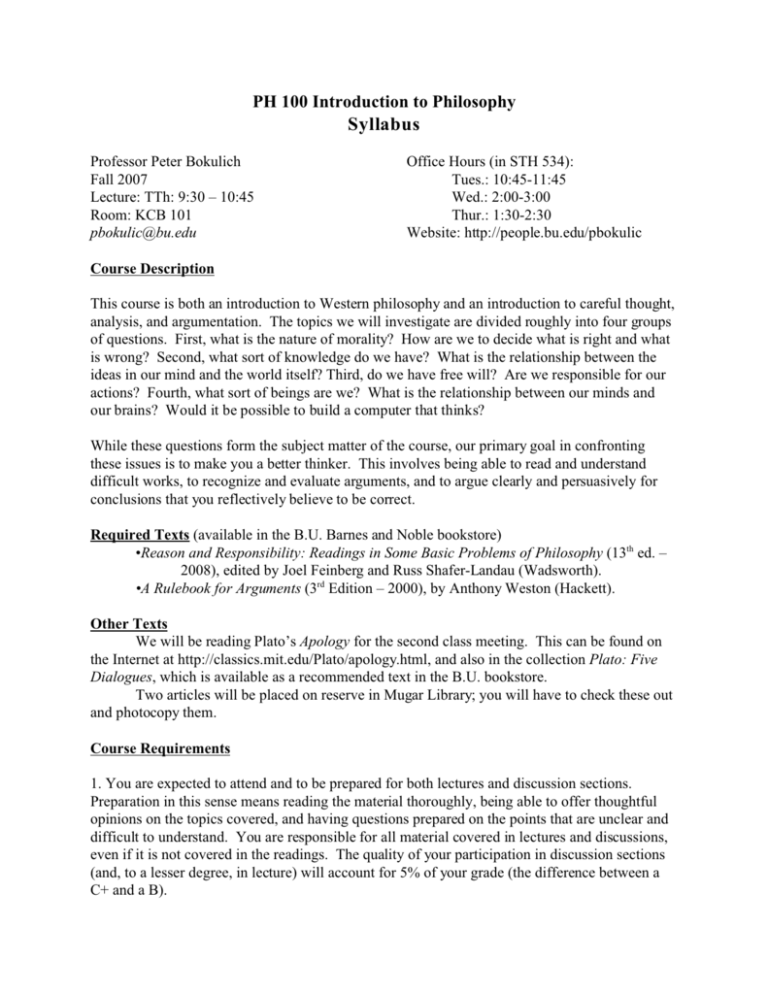
PH 100 Introduction to Philosophy Syllabus Professor Peter Bokulich Fall 2007 Lecture: TTh: 9:30 – 10:45 Room: KCB 101 pbokulic@bu.edu Office Hours (in STH 534): Tues.: 10:45-11:45 Wed.: 2:00-3:00 Thur.: 1:30-2:30 Website: http://people.bu.edu/pbokulic Course Description This course is both an introduction to Western philosophy and an introduction to careful thought, analysis, and argumentation. The topics we will investigate are divided roughly into four groups of questions. First, what is the nature of morality? How are we to decide what is right and what is wrong? Second, what sort of knowledge do we have? What is the relationship between the ideas in our mind and the world itself? Third, do we have free will? Are we responsible for our actions? Fourth, what sort of beings are we? What is the relationship between our minds and our brains? Would it be possible to build a computer that thinks? While these questions form the subject matter of the course, our primary goal in confronting these issues is to make you a better thinker. This involves being able to read and understand difficult works, to recognize and evaluate arguments, and to argue clearly and persuasively for conclusions that you reflectively believe to be correct. Required Texts (available in the B.U. Barnes and Noble bookstore) •Reason and Responsibility: Readings in Some Basic Problems of Philosophy (13th ed. – 2008), edited by Joel Feinberg and Russ Shafer-Landau (Wadsworth). •A Rulebook for Arguments (3rd Edition – 2000), by Anthony Weston (Hackett). Other Texts We will be reading Plato’s Apology for the second class meeting. This can be found on the Internet at http://classics.mit.edu/Plato/apology.html, and also in the collection Plato: Five Dialogues, which is available as a recommended text in the B.U. bookstore. Two articles will be placed on reserve in Mugar Library; you will have to check these out and photocopy them. Course Requirements 1. You are expected to attend and to be prepared for both lectures and discussion sections. Preparation in this sense means reading the material thoroughly, being able to offer thoughtful opinions on the topics covered, and having questions prepared on the points that are unclear and difficult to understand. You are responsible for all material covered in lectures and discussions, even if it is not covered in the readings. The quality of your participation in discussion sections (and, to a lesser degree, in lecture) will account for 5% of your grade (the difference between a C+ and a B). 2. Two essays are required (one 4-5 pages in length, the other 6-7 pages). The topics for these essays will be announced, and you will be given guidance in writing a philosophy paper. The first will be worth 20% of your grade; the second 30%. 3. There will be a midterm (worth 15% of your grade) exam and a cumulative final (worth 30%). For each of these you will be given a large list of terms and questions, and the exam will be drawn exclusively from this list. Late Papers and Make-up Exams Essays must be handed in at the beginning of lecture on the day they are due. Papers will not be accepted in electronic format except in extreme circumstances. Late papers will be graded down 1/3 of grade for each 24 hours of tardiness. This means that if your printer jams before class on Tuesday and you arrive with the paper at 9:32, your B+ paper will receive a B. If you turn it in after 9:30 on Wednesday, you will receive a B!, etc. If you are unable to turn in your paper on time, contact your TF or me as early as possible to explain your situation. You cannot pass this class without turning in all of the assignments, so it is very important that you communicate with us promptly about any missing work. Make-up exams will be granted only under extreme circumstances. Do not make travel plans that conflict with the midterm or final. Plagiarism and Group Studying Plagiarism is any attempt to represent the work of someone else as one’s own. You must give proper credit to the sources of all the formulations and original ideas that appear in your paper. Any questions on this matter should be directed to the professor or your TF before your paper is handed in. Plagiarism is an extremely serious offence and will be treated as such. Those suspected of plagiarism will be referred to the Academic Conduct Committee and should expect to be suspended or expelled from the University. You may form study groups to prepare for the exams, but each member of the group must contribute to each question and term discussed. It is neither wise nor permitted to divide the study list between members without further discussion and deliberation of responses. Members may assist one another, but each member must intellectually own his or her answer. All students are to be familiar with and abide by the Student Academic Conduct Code (www.bu.edu/cas/undergraduate/conductcode.html). Schedule of Readings and Assignments (Subject to Revision) Readings are to be completed before the class for which they are listed. ARfA refers to A Rulebook for Arguments. All page numbers refer to the Feinberg anthology. Sep. 4: Introduction. (What is philosophy?) 6: Plato Apology (web); ARfA Ch. I, VI, and X 11: Midgley “Trying Out One’s Sword” (567-570); Plato “Immoralist’s Challenge” (540-547) 13: Aristotle Nicomachean Ethics (570-586) 18: Mill “Utilitarianism” (640-653) 20: Kant “Good Will & Categorical Imperative” (625-640) (First Paper Assignment handed out) ARfA Ch. VII-IX 25: Descartes Meditations Synopsis, I, & II 27: Descartes Meditations III, IV, & VI. Oct. 2: Locke “Causal Theory of Perception” (197-205) 4: First Paper Due. Berkeley “Principles of Human Knowledge” (205-213) 9: NO CLASS (Substitute Monday) 11: Hume Enquiry Concerning Human Understanding (219-245); ARfA Ch. V 16: Salmon “Encounter with David Hume” (245-264) 18: Popper “Conjectures and Refutations” (264-268); Kitcher “Believing Where We Cannot Prove” (268-279) 23: Paley “Argument from Design” (32-28); ARfA Ch. III Hume Dialogues Concerning Nature Religion (38-72) 25: Behe “Molecular Machines” (copy); Kitcher “Born Again Creationism” (copy) Nov. 30: Midterm Exam 1: Ayer “Freedom and Necessity” (414-419); Stace “Problem of Free Will” (419-424). 6: Kane “Free Will: Ancient Dispute, New Themes”(445-458); Pereboom “Why We have No Free Will” (464-477) 8: Wolf “Sanity and the Metaphysics of Responsibility” (501-513) (Second Paper Assignment handed out) 13: Chisholm “Human Freedom and the Self” (438-445); Fischer “My Compatibilism” (425-438) 15: Gertler “Mind-Body Dualism” (285-297); Carruthers “Mind is Brain” (301-309) 20: Churchland “Behaviorism, Materialism, and Functionalism” (309-321) 22: NO CLASS (Thanksgiving) Nov. 27: Second Paper Due Turing “Computing, Machinery, and Intelligence” (321-330); Lycan “Robots and Minds” (342-348) 29: Searle “Minds, Brains, and Programs” (330-342) Dec. 4: Jackson “The Qualia Problem” (297-301) 6: Parfit “Divided Minds” (373-378); Dennett “Where Am I?” (378-387) 11: (Last Class) Perry “Dialogue on Personal Identity” (387-407) 15: Final Exam 9:00 (Subject to revision by University)
